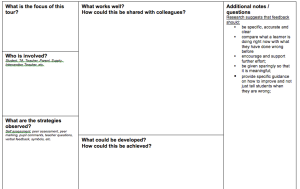This evening I led a staff meeting on feedback and marking. The session was designed to provide staff with the opportunity to share effective examples of their practice, look through the books from across KS1 and KS2 and discuss the issues that can impact the efficacy of feedback.
I began the session by exploring some of the key findings from a range of research in order to ensure our discussions were framed around what – as has been identified – constitutes high quality, impactful feedback for learners. Synthesising the research in one post here would be time-consuming (see my SlideShare of the session below for the key points shared during the session) and exploring the research is actually more developmental for us as teaching professionals, I believe, if it is considered through discussion and dialogue with others. Certainly, I would appreciate the thoughts and comments of anyone reading this post. However, two key points to highlight here are:
- Feedback can have a powerful impact on the progression of children’s learning (see EEF and Sutton Trust findings here), which can be positive or negative depending upon a range of influential factors (time, delivery, type of feedback).
- Feedback should cause pupils to think, not react emotionally (see Dylan Wiliam’s video here).
Having considered the research and discussed the findings against our own experiences and with the children of our classrooms in mind, we moved on to a ‘book look’. However, in order to support discussions and the analysis of feedback throughout the ‘book look’, I reframed it as an ‘Experience Tour’.

Experience Tour questions from the DIY Toolkit website.
An ‘Experience Tour’ is a tool from Nesta’s DIY Toolkit, which has been designed ‘for development practitioners to invent, adopt or adapt ideas that can deliver better results.’ Nesta have developed a range of tools that can be used to reflect upon an individuals practice at various stages throughout any project and are designed, primarily, for social innovation projects. I adapted the tool and altered some of the questions to ensure it suited our purpose.
According to Nesta,
Going on an Experience Tour means immersing yourself totally in a particular environment so you can gain a first-hand perspective of the situation or context. Experience Tours can help ‘ground’ your thinking; they give you a clear perspective for developing ideas that are intimately connected with the people you’re working for.
This tool provides a structure for reflecting upon and collecting insights from your first hand experiences. There are guidelines to help you focus on the experiences of the people you are trying to understand, and to collect the type of materials you will need afterwards to start developing ideas.
I wanted staff to ‘immerse’ themselves in feedback. To gain an understanding of how feedback works across the school and to give them a tool that would enable them to develop their own perspective of feedback in their practice. This tool is designed to be used over a slightly longer period of time and having started, I would now like to provide the opportunity for staff to continue their ‘tours’, moving from reflecting on feedback in books, to experiencing feedback in each other’s classrooms.
Reflecting on the session, I hope the questions and focuses provided on the ‘tour’ helped to concentrate discussions and direct investigations to consider the ‘deeper’ layers that underpin effective feedback, including the range of strategies that can be implemented to ensure it is effective in ensuring learners can progress. Had the tour been extended to include the ‘experience’ of ‘live’ classroom practice, I would have included more of the questions from the original document. Question to self: how useful could the questions be for monitoring of teaching and learning across the school?

One thought on “Experience Tour: Feedback”